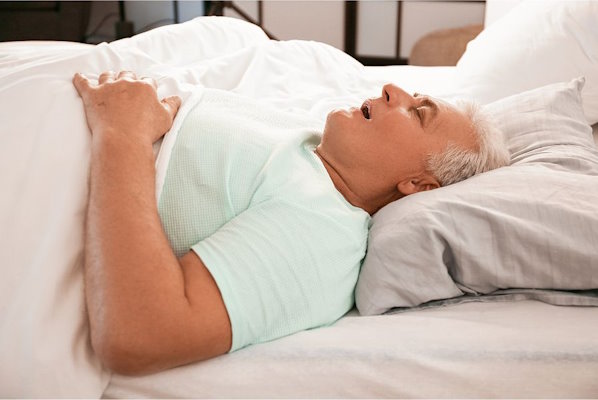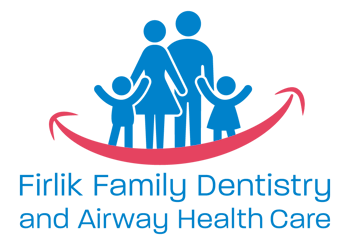Sleep apnea is a condition in which the airway completely collapses – the airway is blocked by the tongue – while a person is sleeping. The brain senses the blockage, awakens the person, and closes the jaw, returning the tongue and throat to their normal positions. This reopens the airway. The person returns to sleep, but the airway will collapse again, and the person will reawaken. A pattern of obstruction and awakening can repeat itself 50 or more times per hour. Sleep apnea often is indicated by snoring.
When the airway is blocked, the person does not receive enough oxygen to her brain. Oxygen deprivation can trigger severe health problems such as damage to the cardiovascular system, and often results in chronic fatigue.
To counteract sleep apnea and/or snoring, we can create a simple appliance that for many people will hold the jaw in a position to maintain an open airway. This reduces snoring and improves breathing while a person sleeps.
Some people instead use a CPAP device, which aids breathing, to treat sleep apnea. However, a CPAP device can be cumbersome, bothersome, and expensive. For many people, an appliance is a better solution.
If you think that you or a family member might have sleep apnea, call our office to see if we can help you find a solution to this unhealthy condition. If you already use a CPAP device, speak with us about using an appliance as a better alternative.
Dr. Firlik can help you avoid serious health problems from sleep apnea…and get a good night’s sleep!

Understanding Sleep Apnea: What You Need to Know
Sleep apnea is a common disorder in which one or more pauses in breathing or shallow breaths occur while one sleeps. These pauses can last from a few seconds to minutes and may occur 30 times or more an hour. This disrupts sleep, leading to daytime fatigue and other serious health problems.
There are three main types of sleep apnea:
- Obstructive Sleep Apnea (OSA): The most common type is caused by airway blockage, usually when the soft tissue in the back of the throat collapses during sleep.
- Central Sleep Apnea (CSA): This less common condition occurs when the brain doesn’t send proper signals to the muscles that control breathing.
- Complex Sleep Apnea Syndrome: A combination of obstructive and central sleep apnea.
Why is Sleep Apnea Serious?
Untreated sleep apnea can lead to:
- High blood pressure
- Heart disease
- Stroke
- Type 2 diabetes
- Depression
- Increased risk of accidents (especially while driving)
Treatment Options
The best treatment plan depends on the type and severity of your sleep apnea, overall health, and personal preferences. Working with Firlik Family Dentistry and Airway Health Care is crucial to finding the most effective treatment for you. Early diagnosis and treatment of sleep apnea can significantly improve your quality of life and reduce the risk of serious health complications.
Symptoms of Sleep Apnea
Do You Have These Sleep Apnea Symptoms?
List of Symptoms:
- Loud snoring
- Gasping or choking during sleep
- Pauses in breathing during sleep
- Excessive daytime sleepiness
- Difficulty concentrating
- Morning headaches
- Dry mouth or sore throat upon waking
- Irritability or mood changes
- High blood pressure
- Nighttime sweating
- Frequent nighttime urination
- Decreased libido
If you experience one or more of these symptoms, it’s important to consult with Firlik Family Dentistry and Airway Health Care to determine if you have sleep apnea.
While these symptoms can indicate sleep apnea, a definitive diagnosis requires a medical evaluation. A doctor may recommend a sleep study (polysomnography), which monitors your breathing, heart rate, and brain activity during sleep. This study can be done in a sleep lab or at home.
